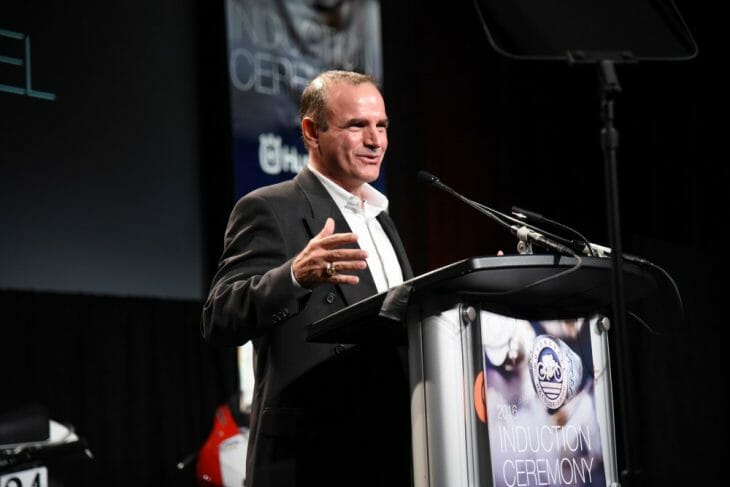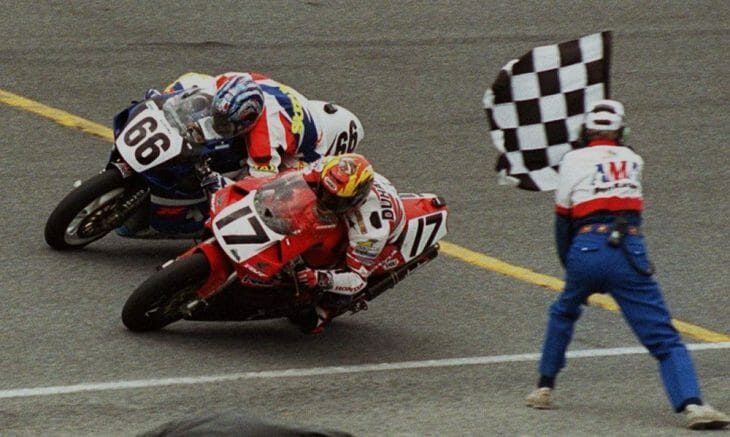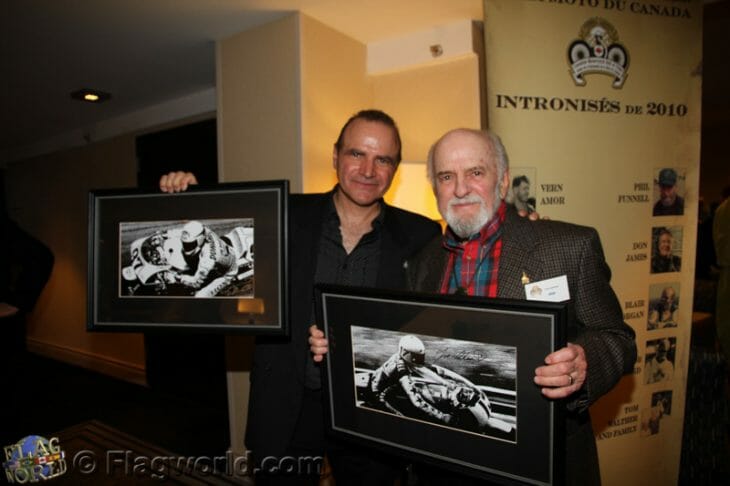Larry Lawrence | March 15, 2017

Miguel Duhamel at his Motorcycle Hall of Fame induction. (Courtesy AMA)
As many longtime motorcycle racing fans can attest, it feels a bit odd when racing heroes whose careers you’ve followed in the not-so-distant past start going into Halls of Fame. Such as the case with road racer extraordinaire Miguel Duhamel.
It doesn’t seem like all that long ago that Duhamel was racking up records in the AMA Pro Road Racing books and now this past year the charismatic Canadian, who was a longtime fan favorite, was inducted into the Motorcycle Hall of Fame in Pickerington, Ohio, and just a few weeks ago, the Canadian Motorcycle Hall of Fame.
It seems like overnight Miguel went from racer to legend.
Road racing fans know of Duhamel’s accomplishments. For nearly 20 years, the LaSalle, Quebec-born rider was one of the most successful riders in AMA road racing. He raced factory machinery across several classes for Harley-Davidson, Honda, Kawasaki, and Suzuki, and won the 1995 AMA Superbike title, five AMA Supersport championships, two AMA Formula Xtreme titles, and the Daytona 200 a record-tying five times.
Duhamel racked up enough wins to eclipse Fred Merkel to become the all-time wins leader in AMA Superbike history in 1998. He held that honor for six years. In addition to that Duhamel was the absolute undisputed king of AMA 600 Supersport racing. His numbers in that series were jaw dropping. He won a total of 40 AMA 600 Supersport races along the way. Second ranked was Mike Smith with 13 wins.
Some people assume since Duhamel was the son of legendary motorcycle (and snowmobile) racer Yvon Duhamel that Miguel’s path to road racing stardom was paved with rose petals, but that just wasn’t the case. When Miguel and his brother Mario were coming up as kids racing, their dad was still busy in his own racing world and the two Duhamel brothers had to become independent and learn to do things for themselves at a young age.
Miguel’s dad also wanted his sons to learn to overcome equipment deficiencies to win.
“When I was racing motocross all these guys had trick suspension and motors,” Miguel recalls. “Most of the time my dad made us race stock bikes. We’d (Miguel and his brother Mario) get so frustrated sometimes that our bikes were slower, we’d try to do modifications to them ourselves. That turned out to be a big mistake because we usually only managed to make them worse.”
Duhamel was on the path to become a motocross/Supercross racer. He had good success in Canada and was looking to move up to race in the AMA, but he was talked into trying road racing.

Duhamel’s 1999 Daytona 200 victory was one of the best AMA Superbike races of all time.
“Coming from motocross, with all the jumps and berms and stuff like that, I thought road racing was boring,” Duhamel recalls. ““The first time I road raced I wasn’t impressed, but then, almost by accident, I was able to slide both tires around a corner and I thought, ‘Wow! This is something!’”
As early as 1989 Duhamel was beginning to show potential in American racing. He scored a podium at Loudon in 1989 in the AMA 250 Grand Prix race, but Miguel’s coming out party of sorts in road racing took place in the Canadian stop of the World Superbike Series at Mosport in 1989. The Duhamel raced a near stock Suzuki GSXR750 and battled for the lead with World Champion Fred Merkel before going a little wide in a turn trying to pass Merkel and crashing out.
While the Mosport race didn’t end the way he’d hoped, it was the first time Miguel began to come out from under his dad’s shadow and show that he was a rising talent in his own rite.
Yoshimura Suzuki recognized his potential and hire him in 1990. He was injured for much of the season, but broke through to win his first AMA Superbike race at Topeka towards the end of the year. He was named AMA Superbike Rookie of the Year.
In spite of his promising 1990 season, at the start of 1991 Duhamel found himself without a ride. When Honda factory rider Randy Renfrow was injured in pre-season tests Duhamel was given the opportunity to fill in for Camel Honda in the Daytona 200. Duhamel made the most of the opportunity and shocked the fans by winning the race. With that win Duhamel’s career was set and his long association with Honda was off and running.

Miguel Duhamel and his dad Yvon at the recent Canadian Motorcycle Hall of Fame induction ceremony. (Courtesy Michel Flageole)
In 1992 Duhamel raced MotoGP (then known as 500cc Grand Prix) for Yamaha France. He scored a slew of top-10 finishes with a fifth in Brazil his best result and finished 12th in the final standings. It was a promising rookie GP campaign, but Kawasaki came after Duhamel hard to come back to AMA Superbike and when no good GP offers materialized, Duhamel followed the money and came back to America.
En route to his 1995 AMA Superbike title, Duhamel won six-consecutive races, an all-time record for the series at the time.
But of all of Duhamel’s accomplishments, perhaps his best remembered win came in the 1999 Daytona 200. It’s been called the greatest race in the history of the series.
A total of 63 riders started the 1999 Daytona 200, but the race came down to just two – Miguel Duhamel and Mat Mladin. Duhamel beat Mladin to the line by a scant .014 of a second, in front of one of the biggest crowds ever to see the race. Many were on hand to watch Daytona master Scott Russell race the Harley-Davidson VR1000 in the historic event, but Russell was getting ready for surgery to repair bones in his face, the results of a fracas at a local Daytona Beach nightclub. Fans didn’t leave disappointed though. They saw a comeback of epic proportions.
It was the miracle comeback race for Duhamel after nearly losing his leg from a crash at Loudon the year before. He walked the pits with the assistance of a walking cane.
“I’m very fortunate,” said Duhamel after the victory. “You’ve got to put things in perspective. I was happy just to keep my leg and have all the people believe in me. Coming back racing, I was willing to accept whatever scenario was going to happen. I worked hard, really hard for the last 10 months now, and it paid off.”
A running joke during Duhamel’s career was what his actual age was. If you look at Superbike media guides in the 1990s, his date of birth changed to a more recent year perhaps three times. It did present a conundrum once when the subject of the oldest Daytona 200 winner came up. Miguel had to decide whether or not to reveal his real age to claim that title. To this day, because of his moveable birth date, no one in racing is really sure of his age and Miguel just smiles and enjoys promoting the mystery.
One thing is certain, riders like Duhamel are timeless and being able to root for guys like him is one of the reasons motorcycle racing has such a dedicated fan base.